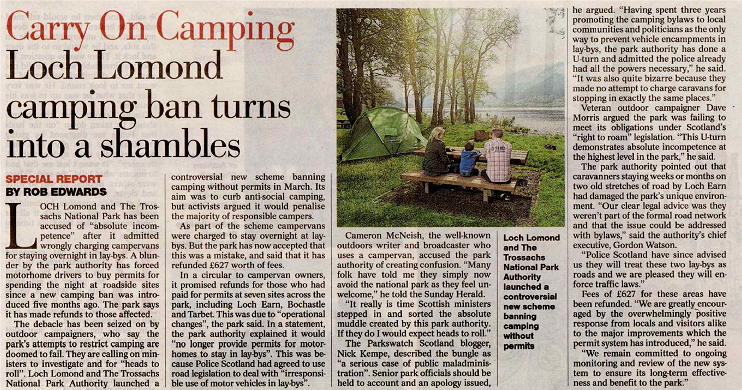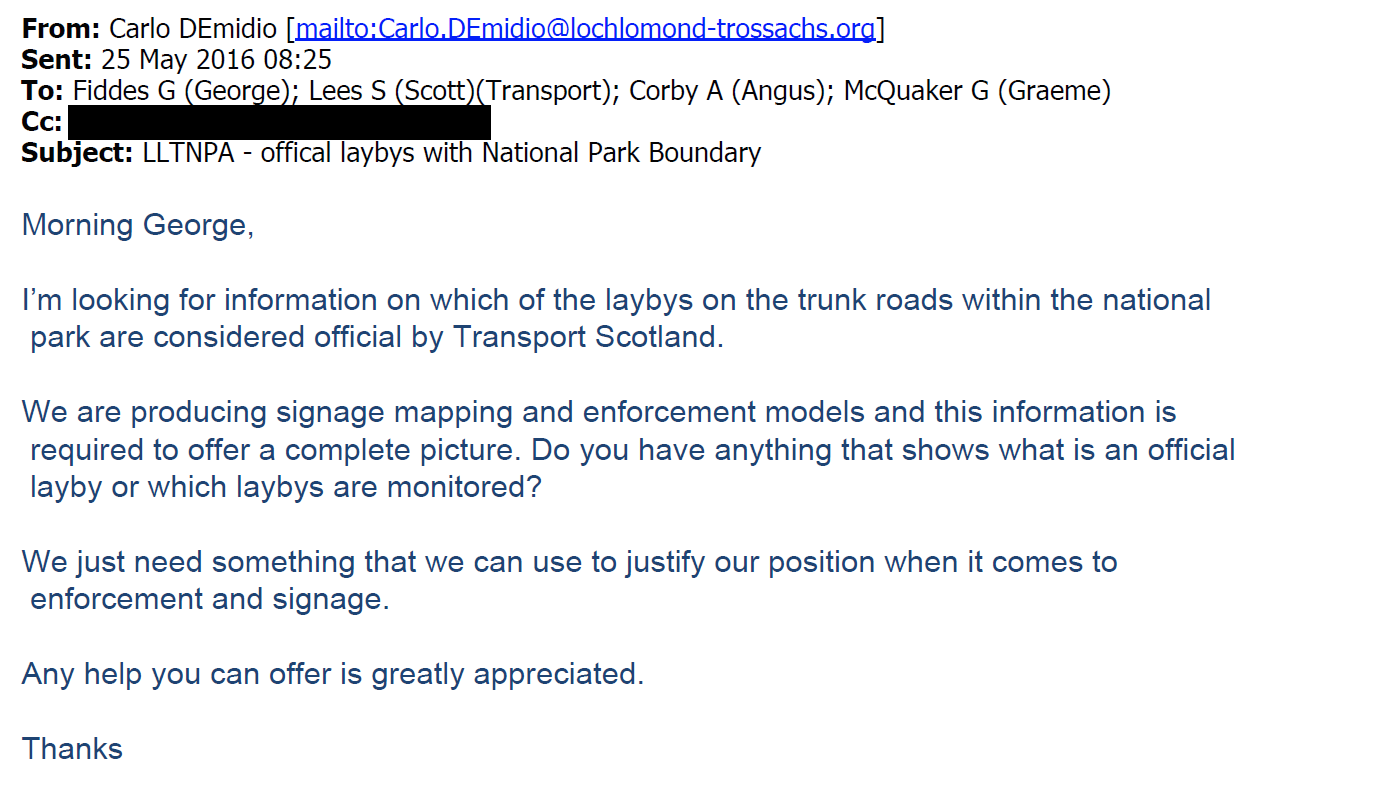
Following my post on the unlawful application of the camping byelaws to campervans (see here), Rob Edwards’ excellent article in the Sunday Herald (I have an interest!) prompted an interesting piece http://bellacaledonia.org.uk/2017/07/10/wild-land/ from Mike Small which is well worth reading:
“Scotland’s divorce from nature is intimately connected to its divorce from land. But whilst we struggle to overcome the engrained iniquity of land ownership we can do something about access to land. From the country that gave the world John Muir the shambles of the national park is pretty depressing”
What has been happening in the National Park though is more than a shambles, its been a deliberate attempt to exclude people from an area which was made a National Park in order to enable people, primarily from the Glasgow conurbation and many of whom have little money, to enjoy the countryside. That was an old socialist aspiration. Its not a coincidence that the same post-war Labour Government that created the NHS also passed the National Parks and Access to the Countryside Act 1949. The camping byelaws, which are only part of a much wider attempt to make the National Park a socially exclusive zone, are now unravelling partly due to incompetence but also because, thankfully, other public authorities have respected people’s rights. In this case the key right is that of people to sleep overnight in a vehicle on the road network.
The LLTNPA’s record on developing the byelaws and the right to stay overnight in vehicles
Rob Edwards obtained from the Park a very interesting explanation for its U-turn on campervans, which once again demonstrates the rotten governance that has been at the heart of how the byelaws have been developed.
“The park authority pointed out that caravaners staying weeks or months on two old stretches of road by Loch Earn had damaged the park’s unique environment. “Our clear legal advice was that they weren’t part of the formal road network and that the issue could be addressed with bylaws” said the authority’s chief executive, Gordon Watson”.
I was surprised at this claim because if Gordon Watson or the Park’s lawyer had asked Transport Scotland – the body responsible for the trunk road network – they would have known that the laybys on the A85 along the north side of the Loch Earn were part of the formal road network and therefore under the byelaws as approved by the LLTNPA Board and Minister, people could sleep there in vehicles. Transport Scotland provided me with a list of all trunk road laybys LL&T National Park Lay-Bys they were responsible for in December 2016. Here is the extract for the A85 along the north shore of Long Earn:

Maybe, however, the Park’s lawyer knew something Transport Scotland didn’t? Its quite clear though that other LLTNPA staff did not know either because, as late as summer 2016, a year after the byelaws were approved by the Board in April 2015, staff were asking Transport Scotland which laybys were part of the formal road network:

(You can read the full correspondence – I am grateful to Transport Scotland for co-operating with my FOI request – here, here and here)
Note, how Carlo DEmidio, the senior manager appointed to improve the Park’s project management (and who has since left the Park) did not know either which laybys were official – perhaps he did not have access to the legal advice provided to his Chief Executive? – and his statement “We just need something that we can use to justify our position when it comes to enforcement and signage”. That does not sound like a Park Authority following legal advice, that sounds more like a Park Authority hell bent on banning campervans whatever the legal advice.
Unfortunately, it may be very difficult to find out the truth on this because legal advice is privileged and exempt from Freedom of Information rules. Whatever the legal advice the Board had prior to approving the byelaws, once Park staff found out that the laybys on North Loch Earn were part of the public roads network, they should have advised the Board.
Instead what appears to have happened is that Park staff, without reference to the Board or apparently the Scottish Government (see here), changed the wording of the camping byelaws. Now under English Law, significant changes to byelaws would normally require further public consultation before going back to the Board for approval but in the Loch Lomond and Trossachs National Park none of this happened. In my view that leaves the legality of the entire byelaws open to question but they key point here is the changes, which were significant, made it even more difficult for the Park to ban people from staying overnight in vehicles.
This is because the original version of the byelaws only allowed people to sleep overnight in vehicles on public roads:
(7) No person shall sleep overnight in a stationary vehicle within a Management Zone unless:
(a) they have been authorised to do so by the Authority under byelaw 12; or
(b) the vehicle is on a public road and such activity is not prohibited by the relevant roads
authority.
The key term here is “public road” which was defined to mean:
“(i) a road or any part thereof which a roads authority has a duty to maintain; (ii) a layby bounded partly by the outer edge of any such road; or (iii) any public car park provided by or on behalf of a roads authority. “
You can see from this why it was so important to work out which laybys on north Loch Earn among other places were part of the public roads network and which not.
In the version of the byelaws which was published in November 2016, however, just over three months before they were implemented, the terms “public road” and “roads authority” had been dropped and replaced by the term “road”. This was defined to mean “a road for the purposes of the Roads (Scotland) Act 1984” and this inadvertently changed the whole scope of the exemption in the byelaws which allowed people to sleep in vehicles. This is because under the Roads Traffic Scotland Act a road is defined to mean any road over which there is a right of passage, private or public. It gave campervans a legal right under the byelaws to stay on anything that looked like a road (such as forest tracks), including its verge, in the camping management zones. Hence why the Park has refunded people who bought permits not just on the public road network at Loch Earn, but also in permit areas created on what appears to be a private road at Tarbert.
What needs to be done
The Park in its response to Rob Edwards was trying to hide behind legal advice in order to defend its unlawful attempt to charge people in campervans for staying overnight on the road network but also to save face with local communities: I am sure St Fillans Community Council will be dismayed. Having been told the byelaws could prevent encampments in laybys, its now clear they did not know what they were talking about and that the whole justification for the byelaws has been a con.
Its worse than that though. Perhaps Park staff could explain on what legal advice they had decided to allow caravans to stop off overnight in laybys in the camping management zones while still trying to ban campervans? The definition of “vehicle” remained unchanged between the two versions of the camping byelaws and clearly included campervans: ” “vehicle” means a mechanically-propelled vehicle or a vehicle designed or adapted for towing by a mechanically-propelled vehicle”. I doubt any lawyer would have made a distinction between campervans and caravans and my conclusion is the staff having been making up the implementation of the byelaws as they go along. Acting beyond their powers. Dave Morris, for it was he, was right to call for Scottish Ministers to investigate.
The LLTNPA Board now needs to issue a clear statement of whether the camping byelaws still apply to people sleeping in vehicles and if so, in what circumstances people could be prosecuted. My own view is that they should clearly state that no-one who is abiding by the Scottish Outdoor Access Code, whether in a campervan or tent, will be prosecuted. As importantly the Board also needs to re-affirm that a primary purpose of the National Park is to enable people to enjoy the countryside and that overnight stays in tents and campervans are an essential part of this right. It should then get on with providing the facilities that campervanners and caravanners need rather than wasting more resources enforcing the unenforceable.
